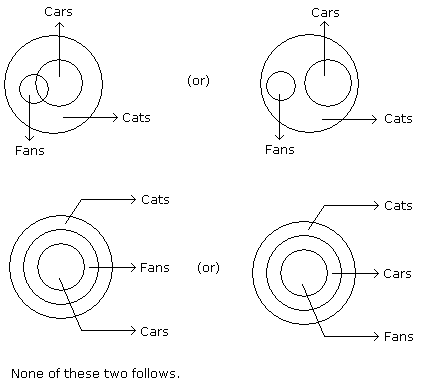Verbal Reasoning - Syllogism - Discussion
Discussion Forum : Syllogism - Syllogism 1 (Q.No. 14)
Directions to Solve
In each of the following questions two statements are given and these statements are followed by two conclusions numbered (1) and (2). You have to take the given two statements to be true even if they seem to be at variance from commonly known facts. Read the conclusions and then decide which of the given conclusions logically follows from the two given statements, disregarding commonly known facts.
Give answer:
- (A) If only (1) conclusion follows
- (B) If only (2) conclusion follows
- (C) If either (1) or (2) follows
- (D) If neither (1) nor (2) follows and
- (E) If both (1) and (2) follow.
14.
Statements: All cars are cats. All fans are cats.
Conclusions:
- All cars are fans.
- Some fans are cars.
Answer: Option
Explanation:

Discussion:
63 comments Page 2 of 7.
Mani said:
1 decade ago
If you see in this case, There are two possibilities are there it may be full or it may be part. So that's why the answer is 'D'.
In many cases I came across this kind of problems, I found 'D' has the solution.
In many cases I came across this kind of problems, I found 'D' has the solution.
Chaitra said:
1 decade ago
So if we get "may or may not " from the Venn diagram should we consider it as "option D"?
SifRizz said:
1 decade ago
It satisfies both the options if we consider 3rd figure so option E will be correct. Anyone can explain how option D is correct.
Ravi said:
1 decade ago
Please add "only" conditions in syllogism.
Rama Krishna Sambari said:
1 decade ago
If we have conclusions like "some of flies being cars is a possibility".
Then the answer will be different. Otherwise just apply the general case.
Then the answer will be different. Otherwise just apply the general case.
Sushma lawrence said:
1 decade ago
According to third diagram both are satisfying. Please explain it clearly.
Zeeshan said:
1 decade ago
All diagram should satisfy. Simple don't go on possibilities. Stick to what is given.
Lohit said:
10 years ago
Sir, it comes in the case of 'Either or'.
Because it has same subject and predictors and also having the some and all case.
I am confused please suggest me.
Because it has same subject and predictors and also having the some and all case.
I am confused please suggest me.
Sudhanshu said:
9 years ago
If there is a question.
Statement
Some rivers are Hills.
No Hill is taxi.
All taxis are buses.
Conclusion
Some taxis are rivers.
No bus are river.
Then, which one is correct?
Statement
Some rivers are Hills.
No Hill is taxi.
All taxis are buses.
Conclusion
Some taxis are rivers.
No bus are river.
Then, which one is correct?
Rohit said:
9 years ago
I also agree, it is neither 1 and 2.
Post your comments here:
Quick links
Quantitative Aptitude
Verbal (English)
Reasoning
Programming
Interview
Placement Papers